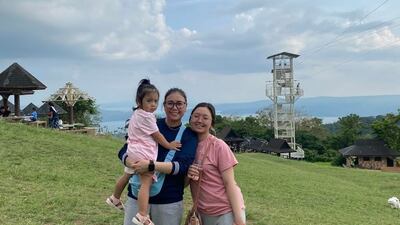When Sherrylou Salinas received a diagnosis of cervical cancer, her only concern was who would look after her two daughters in the Philippines.
But, with the initial stages of her treatment now complete, the 45-year-old Sharjah resident is grateful that her decisive action to seek medical help, combined with the quick thinking of her doctors, may have saved her life.
Now, as cervical cancer health awareness month comes to an end, Ms Salinas is urging women to prioritise regular screenings and check-ups because "it can save lives".
“I never thought it could happen to me as I don’t drink or smoke. I was scared and kept asking why,” Ms Salinas told The National.
“I asked the doctor if I would die. I was only thinking of my two daughters.”
In September last year, Ms Salinas returned home from her work in Dubai when she noticed that she was bleeding.
She rushed to Sharjah's Aster Hospital and, after tests, doctors referred her to an oncologist in Al Qusais, Dubai.
After a biopsy and MRI and PETCT scans, Ms Salinas was told she had cervical cancer and was warned it was spreading, but that there was hope, because the diagnosis had been made early.
“The doctor gave me hope. He smiled and confirmed this type of cancer is treatable with advanced facilities," she said.
"I was worried after searching for the lifespan of cancer patients, and he advised me not to search on Google."
Fighting for her family
Ms Salinas' daughters, 22-year-old Keisha and three-year-old Kallee, were living with her elderly parents in the Philippines at the time, and her desire to see them again is what kept her going.
“I was only seeing them during my 30-day vacation. I knew I had to fight for myself and my loved ones," she said.
After two weeks of treatment, Ms Salinas was not able to go to work.
“My body became weak, and it was hard for me to do anything because of the treatment’s side effects. I could not eat and just wanted to lie in my bed,” she added.
Having finished her treatment on January 9, Ms Salinas will return for tests and scans in February to see if she is clear of cancer. She hopes to see her daughters again in April, if all goes well.
“Little by little, I gained my power, and was able to go to work. I can eat and taste food. My employer gave me sick leave during my treatment, and was very supportive,” she said.
“I feel better but, in my mind, I keep asking when it will end.”
Dr Sivaprakash Rathanaswamy, head of the department of surgery and oncology at Aster Hospital in Al Qusais, told The National that Ms Salinas had undergone chemoradiation, which was completed in December last year.
“Ms Salinas was suffering stage three cervical cancer with pelvic lymph node involvement. She was planned for concurrent chemoradiation and brachytherapy which helps in delivering high doses of radiotherapy to the tumour resulting in better cure rates,” he said.
Cervical cancer is the growth of abnormal cells in the cervix lining. The common cause is human papilloma virus infection, with rare associations including HIV infection and tobacco smoking.
Dr Rathanaswamy said women aged between 21 and 29 are recommended to undergo cytology screening every three years. From 30 to 65, they may continue three-yearly cytology, or undergo simultaneous cytology and HPV screening every five years.
Women aged 65 and over, as well as those who have undergone hysterectomy surgery, do not require screening, he added.
Throughout her ordeal, Ms Salinas has emphasised the crucial role of early detection and urges women to prioritise regular screenings and check-ups.
“Women usually neglect visiting the doctor, but early detection and the HPV vaccine can make all the difference. It can save lives,” she said.
“Being a cancer patient is a life sentence. Once you're done with treatment, you have to do the follow-ups and monitoring for the rest of your life until they declare you cancer-free.”


